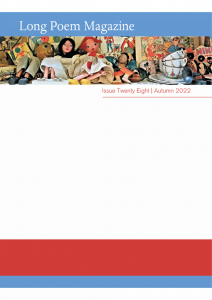We never suggest a theme for an issue of Long Poem Magazine yet it’s often possible to see a clear thread emerge from the poems. In this issue, time is shown over and again to be entwined with art: as we make it, we engage with activities that have finished happening in time and so have become timeless. We poets take time, seemingly endless time, to finish – de-time – a poem. As Michael Lavers describes his process in writing ‘The One World’: ‘[it took] many months – turning to years – of trial and error. Mostly error.’
M Stasiak’s poem ‘Free Will’ claims the ‘exact moment’ that is ‘brutally irreversible’ in any life, the moment that changes a life. In this extraordinary narrative, the poet explains:
The universe begins and particles fly out
and over time there is alignment, coalescence,
restless patterns which emerge, collapse, emerge
and settle into something nearing constancy,
a balance tracking history and the future in the sky.
This long view of time is exemplified by Andy Brown’s poem, ‘Horse Suite’. While it suggests that ‘the riding always happens here and now’, the poem is built from observations made a thousand years ago by Homer’s The Iliad. The poem is a paean to a horse-rider:
and there the thoughtful horses stood entranced
as resolute as tombstones, or marble
monuments . . .
Jaime Robles finishes her poem, ‘A parting distills into art’, with the line ‘Present in the past’, as we all are, of course, genetically speaking. Speaking of dark and light and specifying what is in the shadowy unseen world, the poet says:
I have defined all spaces of time,
not by the number of days
but by the number of our nights
Giles Goodland’s poem (from ‘Of States’) is a dance around the meaning of the verb ‘to be’. Existence being in time, we are forced to try to live in the moment or at least in the day, though none of us really can:
So if you’re asking me am I confused
I am the future face of the wider team. Tomorrow
am asking harder questions.
The metaphors for time in this issue are too many to count. Siriol Troup has taken an overview of her own changing poetic voice, ‘to try to create an impersonal or even de-personalized poetic language, a voice which I hoped might make my poems more expansive, more playful, more ‘contemporary’. ’ She uses the metaphor of a garden changing through summer to winter and beyond: ‘Pick the roses on your way back. / I’m amazed they’ve lasted / so long.’ Addressing the reader in this way allows a poem effortlessly to rehearse those dilemmas we all must worry over, principally when will we die and what agency do we have over our life till the end.
Paul Stephenson says: ‘Writing poems in the aftermath of the sudden death of my long-term partner, I was keen to alternate my use of form and emotional tone, and tell things slant.’ His poem ‘Your Brain’ is composed, he explains, of single sentences and these are rich with physical detail and emotional power. And, in the spirit of the emerging theme of this issue, ‘Your adult life was shorter than it should have been.’ In my observation, this statement is true of everybody.
But there are ways: our essay in this issue, by Jenny Lewis and Adnan Al-Sayegh, is an exploration of the process and political importance of translation. Al-Sayegh refers to the sometimes malign grip our own time has on each of us: ‘I find that creative writing is an act of creative resistance. Every act of love, hope, or creativity in times of war carries within it the power of creative resistance.’ Jenny Lewis, who has translated Adnan’s work, describes ‘the open and fluid process [of translation] that a vast number of international poets now use as a way of bringing each other’s work to wider audiences.’ ‘Between [myself and Jenny]’ Adnan says ‘we have built beautiful and brilliant bridges of light between two languages, two cultures, and two worlds. Without translation the other cannot be understood and communicated with.’
We are grateful to poets who use their time to create (and by translating re-create) longer work. As the introductions to these poems show, the growth of a long poem is often arduous and always a marker of the passage of precious time in a poet’s life. You, reader, will give back your time to enjoy the results and we’re grateful for that too.
Claire Crowther
